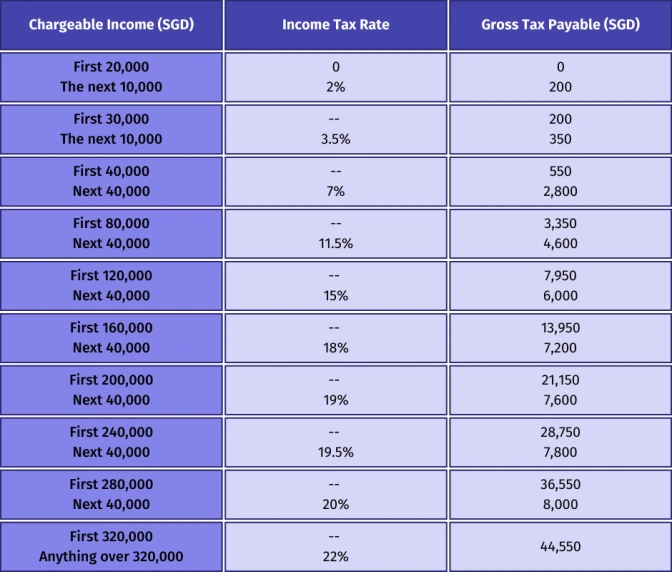What Are Singapore's Personal Tax Rates?
How much of your salary will be going to the “Gahmen”?
- Taxes are a financial charge on the taxpayer by a governmental organisation, used to help fund public goods and services such as healthcare, education, infrastructure and defence.
- The most significant contributor to Singapore's tax revenue is personal income tax, which you start paying after earning $20k of chargeable income.
- Personal income tax starts after earning $20k of chargeable income. The tax rate starts low (2% for the first $10k above) and progresses to a still low maximum of 22% of chargeable income (above $320k).
Singapore’s Personal Tax Rates
The tax rate you pay depends on whether you are a tax resident or non-resident in Singapore. The following income tax rates apply to tax residents, which includes Singapore citizens, permanent residents, or foreigners who have completed 183+ days of work in Singapore that tax year:

As you can see, personal income tax rates get progressively higher as you earn more, up to a "marginal rate" of 22%. The marginal rate doesn't refer to what you pay on everything you earn, but to the highest band of income that you earn.
For example, if you earn $190,000 a year, your tax band is a marginal rate of 18% (see table above), but you only pay that rate on the $30,000 you earned above $160k, in other words, $30,000 * 18% = $5,400.
This would be added to the $13,950 you pay on the first $160,000 you earned, for a total tax bill (excluding other deductions) of $19,350 or just 10.18% of your annual gross pay.
Roughly 80% of all personal income tax collected comes from the top 10% of taxpayers.
Individuals Who Qualify as Non-residents of Singapore
Those in short-term employment (60 days or less in a year) are exempt from employment income tax unless the individual is a company director, public entertainer (e.g. musician), or exercising their profession in Singapore.
For those in Singapore for 61-182 days a year, employment income is taxable at 15% or the resident rate, whichever amounts to the most tax owed.
For directors and consultants, fees and additional income are taxed at 20%.
Non-tax residents could benefit from the Not Ordinarily Resident Scheme’s (NOR) favourable tax treatment. For more information on that, you can check out the IRAS guide here.
When Are My Personal Taxes Due?
All Singaporeans’ owing tax must complete a tax return, stating all income earned from the previous calendar year, by April 15th each year. A date for your diaries!
Note – not everybody has to file a tax return! For example, those earning under $22,000 PA.
Additional Types of Taxes: Personal and Corporate
Property Tax (Residential)
A progressive tax levied on property owners based on their properties’ expected rental value. It is applicable to both private and public housing. The tax is imposed regardless of whether the property is occupied or vacant.
There are lower property tax rates for owner-occupied residential property (0-23%) than for non-owner-occupied residential property (11-27%).
Any rental income earned is subject to income tax, whereas the property itself is subject to property tax.
Stamp Duty
Levied on commercial and legal documents associated with stocks & shares, immovable properties, mortgages and share transfer documents. A common example of stamp duty being applied is when a property is purchased, sold, or leased. The tax is progressive, getting higher as the property value increases. Rates range from 1-6% for residential property or 1-5% for non-residential property. The tax forms roughly 11% of total tax revenue.
Goods & Service Tax (GST)
Also known as Value Added Tax, GST is an indirect tax on consumption. GST is paid when money is spent on nearly all goods or services in Singapore. The amount in tax owed is usually factored into the advertised price. Exemptions include financial services and the sale or lease of residential property. The current GST rate is 9% and forms 21% of total tax revenue.

Motor Vehicle Taxes
Taxes, other than import duties, are imposed on motor vehicles. There are multiple taxes, such as registration fees, excise duty, Vehicle Emissions Scheme, and road tax, to limit the number of vehicles on the road.
Betting Taxes
Duties on betting, private lottery, and sweepstake. Forms roughly 4% of total tax revenue.
PERSONAL TAX RATES. COMPLETED. ✅
Sources:
- https://tradingeconomics.com/country-list/personal-income-tax-rate?continent=asia
- https://www.which.co.uk/money/tax/capital-gains-tax/capital-gains-tax-allowances-and-rates-a0muq0c65cd7
- https://taxfoundation.org/capital-gains-tax-rates-in-europe-2020/
- https://home.kpmg/xx/en/home.html
- Cover photo from Pexels
